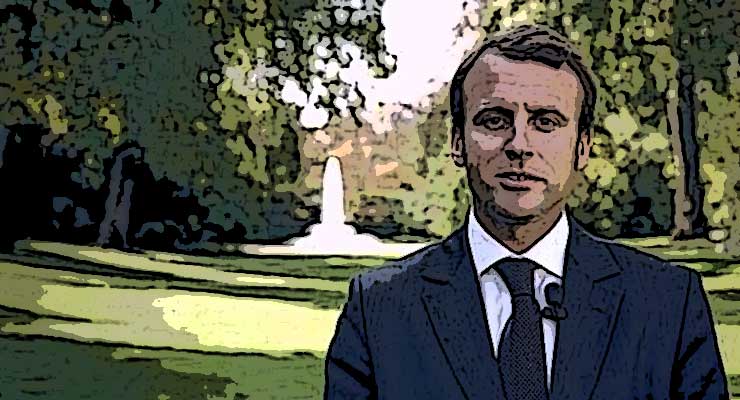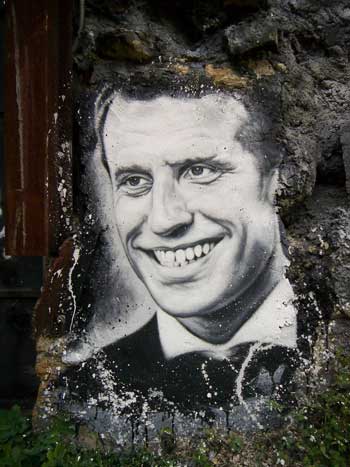
Emmanuel Macron was known as the star minister of Francois Hollande’s cabinet, experienced in the terrain of investment banking (having a rich background with the Rothschild firm) and also being a member of the elite bureaucratic corps of the Government’s Tax Inspectors. Macron was also known as the Elysee´s Mozart because of his brilliancy with the piano; furthermore, he was one of the most charismatic members of the government. But on the 30 of August of 2016, Emmanuel Macron quit his position as Minister of Economics, leaving a vacuum at the French government, and putting Francois Hollande in a very delicate position. On November 16 of 2016, he announced his candidacy for the Republic, as the leader of the political party En Marche!.
Emmanuel Macron has been very talented in building his platform as a catch all party, presenting himself as the Choice to beat a corrupt and inefficient system of two parties: Socialist party at the Left , and the UMP at the right, who haven´t managed to sort out the problems of the French people. He has positioned En Marche! not at the Left or right , but at the heart of the issues that matter most to the French: employment, especially among the youth, security and International politics. According to polls conducted by TNS-Sofres, Macron obtains 12%-14% of voting intention, but possesses a major advantage: he takes votes everywhere, 4 points behind Nicolas Sarkozy (14%-18%), but far from Marine Le Pen with 27%. However, a poll by Odoxa shows that for 45% of the French , Macron can be good president, only behind Alain Juppé with 56% of approval rate.
In summary, the candidacy of Emmanuel Macron would take 1 or 1.5 points of the extreme Left wing Jean-Luc Melenchon (11% voters), 2.5-3 points of Francois Hollande (23% of voters), 3 points of Francois Bayrou (25% of voters), 4 points of Nicolas Sarkozy (18% of voters), 6 points of Juppe (18% of voters), and 2 points of Marine Le Pen (7% of voters). What we can take from this is that he obtains most of his voters from the Socialist and MODEM meltdown and most of the UMP. Therefore, it is easy to conclude that Macron´s figure poses a danger for the two major parties.
The Nation Front of Marine Le Pen, is the least affected by the Macron Phenomenon, with just 7% of its voters on the risk of being taken by En Marche!. The Socialist Party is the one who bears the highest chance of experiencing a massive debacle on the next elections, the results of the polls published by L´Observateur on October 2016 showed that 27% of the French would vote for him, which gives him the highest rate among the Left-candidates ahead of Jean-Luc Melenchon (22%), Manuel Valls (18%) and Arnaud Montebourg (17%), and Francois Hollande (12%).
Macron however fades among two sectors of the Left-wing voters, according to the Institute Elabe, Jean-Luc Melenchon, obtaining a 41% of approval rate among the Left sympathizers, surpassing Manuel Valls (36%), Emmanuel Macron (34%), Arnaud Montebourg (32%), and Francois Hollande (31%). The results are pretty much similar regarding the approval rate among the socialist sympathizers with Manuel Valls leading with 43%, Francois Hollande (39%), and Macron at last 36%. Macron isn’t leading on any of these sectors, but the difference with the other candidates is not that much, so is not that much to overcome.
En Marche! isn´t just another grass-roots phenomenon, such as M5S in Italy or Podemos in Spain, it presents a candidate with professional experience at the private sector, as well as a wide background in politics. Furthermore, just in September 2016, En Marche! claimed the support of 40 deputies as well as 80.000 affiliates. One of the most feverous supporters is Gerard Collomb the major of Lyon, along with the experienced ex-minister Renaud Dutreil, or Daniel Cohn-Bendit. It combines the anti-establishment rhetoric which is pretty similar to that of Donald Trump (making it attractive for voters of the National Front and Jean-Luc Melenchon) and also represents a breakup of the right-left power structure that makes it a powerful opponent. Added to this fresh-image, he is largely free of scandals unlike Sarkozy or other politicians.
In addition to that, Macron has the backup of the Powers-that-be, incarnated in the private Bilderberg Club, who gathers every year for a week, to discuss world affairs. Macron was invited to the meeting that took place in Copenhagen, Denmark, between 29 May and 1 June 2014. At the same meeting he assisted Henri de Castries CEO of Axa Security; when En Marche! was created. The party’s headquarters were placed at the private address of Laurent Bigorgne, the director of the Montaigne Institute, a think tank with a neo-liberal ideology. One of the chief bankrollers of the Montaigne Institute was none other than Henri de Castries. Macron´s contacts in the French oligarchy don’t stop there: two key supporters are Alain Minc, CEO of Sanaf, the French branch of Albertis, and Jacques Attali, the media guru who advised President Francois Mitterrand.
But that is only the tip of the iceberg, it also includes Henry Hermand, administrator of the think-tank Terra Nova, and also a real estate tycoon, Claude Bebear, founder of the insurance giant Axa, Jean Peyrelevade, ex president of Credit Lyonnais, Marc Simoncini, founder of Meetic, Said Hammouche, sponsor of the recruitment cabinet Mozaik RH, Catherine Barbaroux, chairman of ADIE (Association for the right of an economic initiative) and Xavier Niel, sponsor of Illiad-Free. An intriguing feature of his sponsors is the presence of experienced entrepreneurs in the 2.0 mass media, such as Gael Duval (JeChange.fr), Axelle Tessandier (whose company is based at the USA), Ludovic Le Moan (Sigfox)m and Frederic Mazzella (BlaBlaCar). Henry Herman, tycoon of HH Development, and a real Kingmaker of French politics who backed Michel Rocard, and Pierre Mendes France has been very explicit on its intentions of seeing Macron as the next president of France.

In the political arena, apart from the above mentioned Gerard Collomb (PS), there are other figures like Richard Ferrand (PS), Arnaud LeRoy (ex backer of Montebourg), Christophe Castaner, Stephane Travert , Corinne Erhel, and the senator of the socialist party Francois Patriat.
In addition to that, the leader of the centrist party UDI Jean-Christophe Lagarde has admitted that his party and Macron have similarities, so there is a common ground to build a Joint candidacy for the presidency. Macron´s inner circle is mainly composed by most his previous advisers such as Julien Denormandie (director of cabinet at Bercy), Ismael Emelin (Communications adviser), and Stephane Sejourne (parliamentary counselor), Pacome Rupin, and Ludovic Chaker.
En Marche! has a deep penetration in French intellectual circles too after building an efficient network of thinkers such as Thierry Pech, Erik Orsenna or Philippe Aghion. However one of the most important backers is Gilles Finchelstein, director of the Jean-Jaures Foundation, an extremely influential think tank who has traditionally colluded with the Socialist Party.
Ultimately, Emmanuel Macron is trying to repeat a strategy devised by the socialist party back in 1971 during the congress of Epinay when Francois Mitterrand was elected secretary general of the socialist party, breaking up with the communist ideology to embrace liberalism. This is becoming the obvious route to power for Macron, which is repeating one of the oldest Tricks of the Left-wing: embrace liberalism just as the authors Jacques Julliard and Jean-Claude Michea document on their books, ‘Les gauches francaises 1762-2012’ and ‘Les mysteres de la gauche.’ After the victory of Francois Fillon in the right wing primaries, the ex finance minister has asked for the support of Francois Bayrou and the voters of Alain Juppé to join his movement En Marche!.
En Marche! catch-all appeal means a danger for the right wing party UMP, since the victory of the hardliner Francois Fillon at the primaries means a possible leak of voters of the NF of Le Pen to the UMP, it could also well provoke an influx of voters who were Juppé supporters to Emmanuel Macron. Furthermore, the victory of Fillon has reopened the debate inside the Nation Front regarding which line must be followed, that of Florian Phillipot, ‘ Front National du Nord’ which stands for a strong state, economic intervention and protectionism, and that of Marion Marechal Le Pen ‘ Front National du Sud’, being a fierce defender of the traditionalist values of the family, a strong anti-abortion position, and the defense of the Christian roots and history of the French nation. This opening of this debate could play on Macron´s favor.
The Macron phenomenon is the darling of the establishment, the one in favor of globalization, and the FTA with the USA, something Francois Hollande was adamantly opposed to. Emmanuel Macron is, as the sociologist Monique Pincon Charlot pointed out on the French television, a representative of the oligarchy, the dominant class.
Dianne Shatin says
I was fooled by Macron as a very naive American voter. Who is this Macron? He won the election alright bit has shown the people of France what a nightmare he and his administration trily are. A man so devoid of experience who has no idea of the economic condition of the people over ehom he presides. Tne fuel tax ahd the austeriy budget
out of the gate are Thatcheresque. Macron makes Scrooge appear generous. People foolishly bought into his campaign lies. Now je and his Administration will have h*ll to pay. He couldn’t even analyze the consequences of the draconion gas tax the egregious austerity budget would destabile the nation of France and her people. He is but a shill for the Rothchild’s and global AI and global corporate interests…how subject to campaign manipulation we all are.
VIVE L’ FRANCE…VIVE the People of Francs